Are Coffee Grounds Bad For Gardens
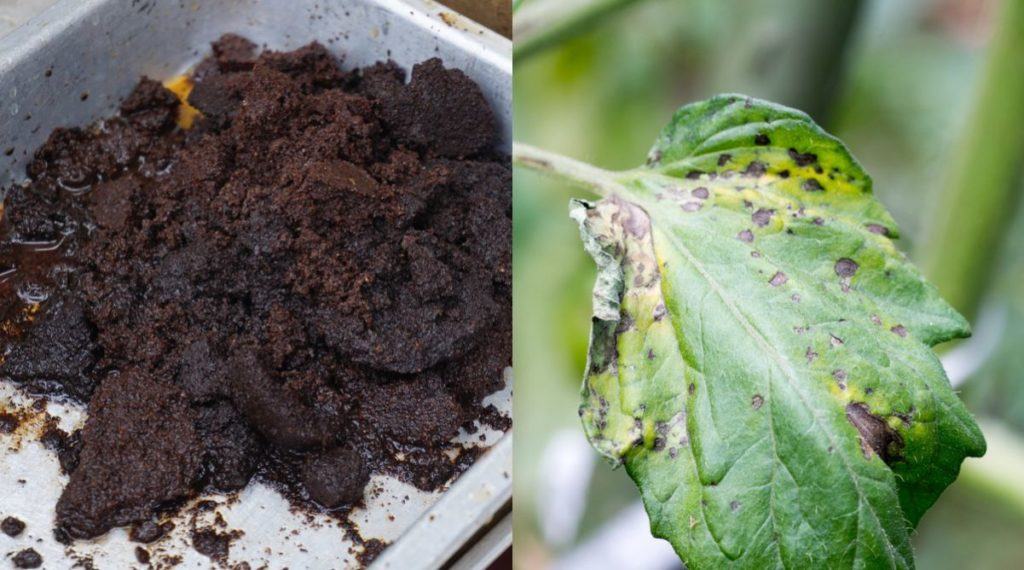
A quick search for "Using coffee grounds in the garden" and Google will unleash a deluge of links to articles telling you to save those spent grounds!
We are advised to put them in the garden for perky plants and bright blue azaleas. Coffee grounds ward off slugs! Put coffee grounds in your compost for healthy soil and earthworms! Grow HUGE plants with coffee grounds! Some even suggest using coffee as a mulch.
It doesn't take long to see that coffee is touted as the panacea of the garden. Whatever you're gardening issue is, it seems coffee can fix it.
(As a coffee-lover, I'm already convinced of the magical properties of coffee to bring me back to the living.)
But are coffee grounds really all that great for your garden?
Once you start digging into Google's massive list of articles, conflicting information begins to surface. Coffee grounds are too acidic; coffee grounds aren't acidic at all. Coffee is terrible for your compost; coffee makes excellent compost, etc.
Because I love you, Rural Sprout readers, I spent a couple of hours sleuthing on the internet to cut through the myth and bring you the truth.
You might want to sit down for this.
But make a cup of coffee before you settle in to read. We're about to fall down the rabbit hole.
Here's what I found.
Can coffee grounds acidify your soil?
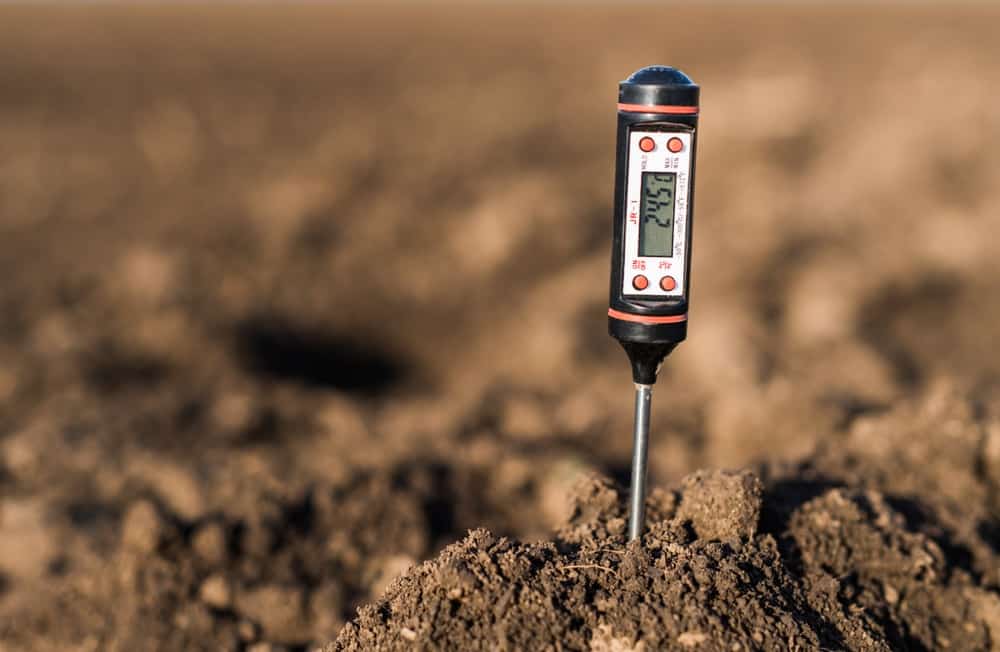
Probably the most common gardening advice for spent coffee grounds is to use them to acidify your soil.
It makes sense; everyone knows coffee is acidic. There are quite a few low-acid coffee blends on the market these days. The question is, how acidic are coffee grounds, once you've made your coffee.
Turns out, not very acidic at all.
The Oregon State University Extension tells us that the acid in coffee beans is water-soluble. So, in the end, it's your cup of coffee, not your used grounds that end up being acidic. Used coffee grounds come in with a pH of 6.5 to 6.8. That's pretty basic. (Heh, pH humor.)
Sorry guys, it looks like this common practice is pure myth, spent coffee grounds are practically pH neutral.
I wouldn't suggest putting fresh coffee grounds on plants to acidify your soil either. Yes, that's a bit of foreshadowing, keep reading.
As we've already learned, the acid is water-soluble and will be washed out of your soil pretty quickly, leaving you to apply more and more coffee grounds.
But wait…
Aren't coffee grounds supposed to make good mulch?
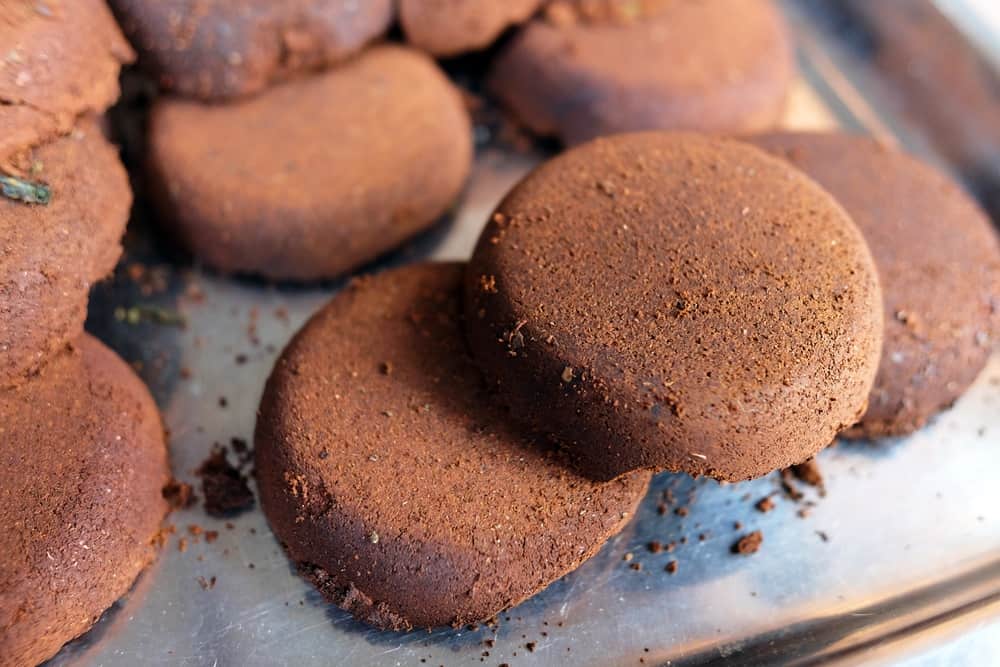
Nope, this perennial garden advice is busted as well.
Remember all those pucks of spent grounds you see at your local coffee shop after they've made your espresso shot? Coffee grounds compact too quickly which doesn't make them an ideal media for mulch. Your mulch needs to breathe to let water and air in as well as out of the soil.
Quite a few scientists are interested in the coffee question too, as I found several scientific studies concerning the use of coffee grounds in the garden.
So are coffee grounds useful for making great compost?
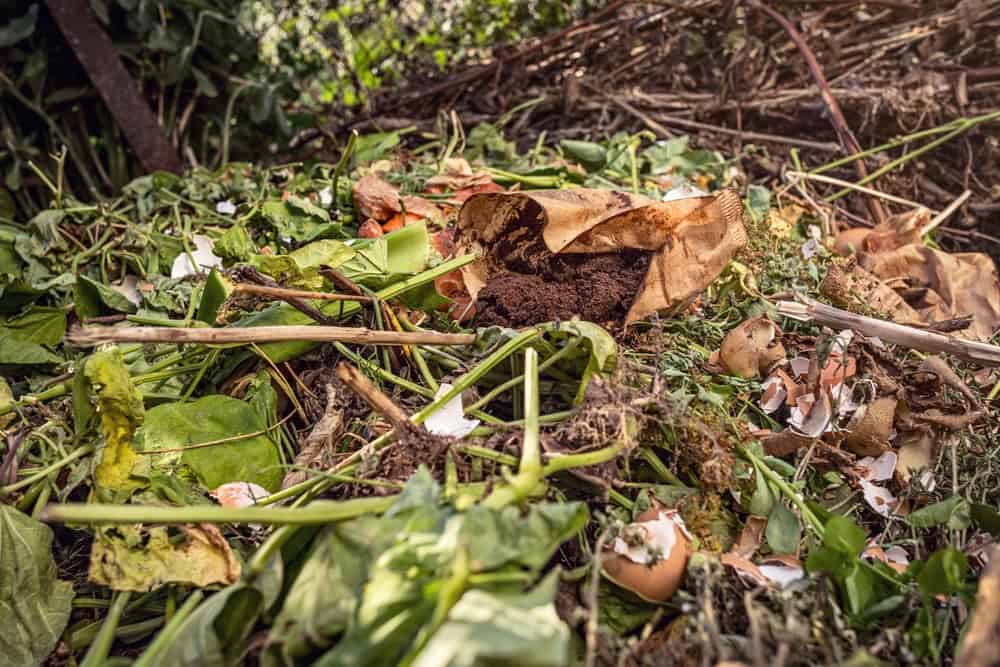
Nearly as popular as using coffee to acidify your soil, is the use of coffee grounds to compost.
One study compared three different composting methods to measure the effect of adding coffee grounds to your compost. In all three methods they found an increase in the death-rate of earthworms.
Eeesh, poor little guys!
Apparently as the coffee grounds break down, they release "organic compounds and chemicals" which kill the worms.
It would appear that coffee grounds are not so great for earthworms after all. And you need more earthworms in your soil.
And as if murdering innocent earthworms wasn't bad enough, it appears that coffee has antibacterial properties, too.
So, instead of helping the thriving microbiota of your compost, tossing those coffee grounds in could actually kill off helpful microbes.
If you do decide to add coffee to your compost, do so sparingly. Despite its color, coffee is considered to be a 'green' addition, so it needs to be mixed in with plenty of 'brown,' like dried leaves.
What about using coffee grounds for killing slugs?

Well, if coffee is good at killing things, then surely the advice to use coffee grounds to kill slugs or repel them is accurate, right?
This one is a big fat maybe.
Robert Pavlis of Garden Myths, set up his own experiment with slugs and coffee grounds, and he says the coffee grounds don't even slow them down!
I read other anecdotal advice saying that slugs won't even go near coffee grounds. While I can't say with certainty that coffee grounds will repel slugs, in this case, it can't hurt to try.
However, I wouldn't put the grounds too close to the plants you are trying to protect.
That's right, more foreshadowing.
Here are some ways that do work for keeping slugs away.
The #1 reason why you shouldn't put coffee grounds on your plants
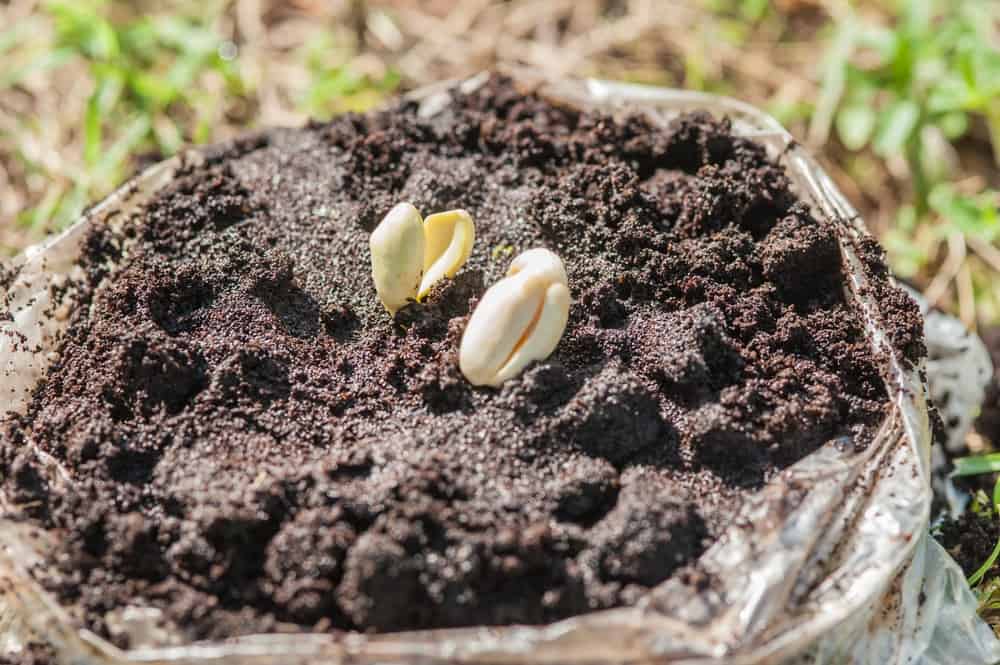
Why do I keep warning you not to put coffee grounds on your plants?
Because as we all know, coffee is caffeinated.
As much as we like to think caffeine was created for humans, evolution had other ideas.
Science tells us caffeine was first a mutation in plants which was accidentally copied and passed on. Caffeine gave plants (think tea plants, cocoa and coffee trees) an edge over competing plants growing nearby.
How? The caffeine in these plants' fallen leaves would "poison" the soil so that other plants nearby couldn't grow.
Still want to put those coffee grounds on your prize tomatoes?
It's been demonstrated in a number of studies, that caffeine suppresses plant growth. Caffeine reduces germination rates in many plants by tying up the nitrogen in the soil.
This study, in particular, cracks me up. The title of the paper tells you all you need to know, "Applying spent coffee grounds directly to urban agriculture soils greatly reduces plant growth."
Okay, I'm sure you're thinking, but I already brewed my coffee, there can't be that much caffeine left in the spent grounds, right?
Unfortunately, depending on the brewing method, yes, there can be!
Caffeine Informer sites a 2012 study conducted by The Department of Nutrition, Food Science and Physiology, School of Pharmacy, University of Navarra showing spent coffee grounds can contain up to 8.09 mg of caffeine per gram of grounds.
With these numbers in hand, Caffeine Informer states that the average amount of coffee grounds used to brew a shot of espresso can still have up to 41 mg of caffeine. That's nearly the same amount of caffeine that's in a cup of black tea!
Aha!
It appears we may have finally stumbled across the best use for coffee grounds in the garden – weed killer!

Remember, caffeine inhibits plant growth. This study conducted by the International Plant Propagator's Society noted that using coffee grounds did result in lower germination rates. White clover, Palmer amaranth, and perennial rye were the three plants used in their study.
Perhaps a liberal sprinkling of coffee grounds on pesky weeds is just what you need to give them the boot. Or try boiling them to make a concentrated weed-killing spray.
I'm sure by now you are a little disheartened with the news that coffee isn't the best thing to give you a pest-free garden with a bigger yield. Maybe you are even nervously eyeing that pile of coffee grounds you dumped in the compost bin.
You're probably thinking, "What the heck am I going to do with all of those spent coffee grounds now?"
Well, my friend, I've got good news, you can use them around the house. I've already got 28 great ideas for you to try.
Pin This To Save For Later
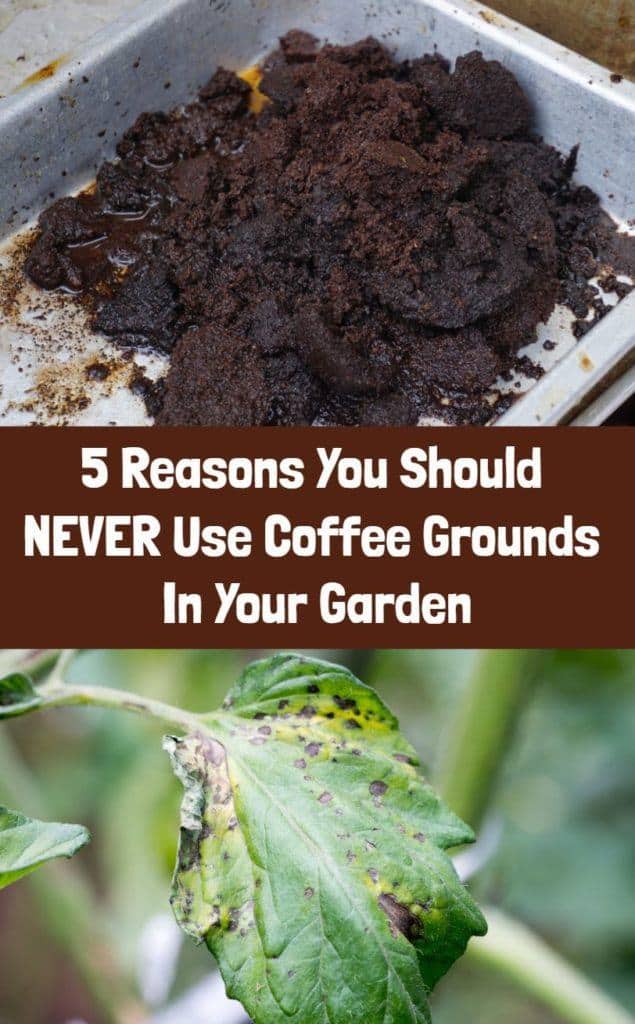
Read Next: 15 Brilliant Uses For Eggshells In The Home & Garden
Hey there, Rural Sprout reader, my name is Tracey, and I'm so glad you popped over to my bio. Originally from upstate NY, I'm now an honorary Pennsylvanian, having lived here for the past 12 years.
I grew up spending weekends on my dad's off-the-grid homestead.
He built our rough-hewn log cabin when I was seven years old, and I spent much of my childhood roaming the woods and getting my hands dirty.
I learned how to do things most little kids haven't done in over a century.
We were always busy. Whether it was pressing apples for homemade cider or trudging through the early spring snows of upstate NY to tap trees for maple syrup, there were always chores with each new season.
I learned how to preserve what we grew in our garden.
And dad was organic, long before it became the popular buzzword that it is today.
As an adult living in the modern world, I continue to draw on the skills I learned as a kid. I love my Wi-Fi, and knowing pizza is only a phone call away. But I'm okay with never revisiting the adventure that is using an outhouse in the middle of January.
So, these days I consider myself to be almost a homesteader.
I take an eclectic approach to homesteading, utilizing modern convenience where I want, and choosing the rustic ways of my childhood simply because they bring me joy.
I'm a firm believer in self-sufficiency, no matter where you live, and the power and pride that comes from doing something for yourself.
I garden, even when the only space available is the rooftop of my apartment. I've been a knitter since age seven, and I spin and dye my own wool as well. And if you can ferment it, it's probably in my pantry or on my kitchen counter. I can't go more than a few days without a trip deep into the Pennsylvania State Game Lands looking for mushrooms, edible plants, or the sound of the wind in the trees.
My gift of gab and sense of humor via the written word keeps me busy as a copywriter and freelance blogger.
If you need copy that grabs your readers by the eyeballs and keeps them glued to your page, then I'm your gal. You can find me at BesemerWrites.
Follow all of my crazy homesteading adventures on Almost a Homesteader and Instagram @traceyleezle
Peace, love, and dirt under your nails,
Tracey
Are Coffee Grounds Bad For Gardens
Source: https://www.ruralsprout.com/coffee-grounds-in-the-garden/
Posted by: martinquier1967.blogspot.com

0 Response to "Are Coffee Grounds Bad For Gardens"
Post a Comment